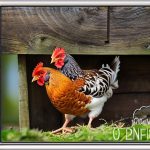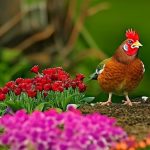Chickens have specific requirements for optimal health and well-being, particularly during winter. These include:
1. A warm, dry environment to protect against cold and damp conditions
2.
Access to fresh water to prevent dehydration
3. A balanced diet to maintain health and egg production
4. Protection from predators
5.
Adequate space for movement and exercise
Chickens are more susceptible to cold temperatures than mammals due to their limited ability to regulate body temperature. This increases their risk of frostbite and hypothermia. They also require protection from drafts and dampness to avoid respiratory issues and other health problems.
To address these needs, chicken owners should provide:
1. A well-insulated, ventilated coop that allows air circulation without creating drafts
2. Consistent access to unfrozen water
3.
Appropriate nutrition to support their health in colder conditions
4. Secure enclosures to protect against predators
5. Sufficient space for the flock to move and exercise
By meeting these requirements, chicken owners can ensure their flock remains healthy and comfortable throughout the winter months.
Table of Contents
- 1 Providing Adequate Shelter for Chickens
- 2 Insulating the Chicken Coop
- 3 Using Heat Lamps and Heaters Safely
- 4 Providing Warm Bedding for Chickens
- 5 Ensuring Access to Fresh Water
- 6 Monitoring the Health of Chickens in Winter
- 7 FAQs
- 7.1 What are some ways to help keep chickens warm in winter?
- 7.2 How can I insulate my chicken coop for winter?
- 7.3 Is it safe to use heat lamps or heated pads for chickens in winter?
- 7.4 What should I feed my chickens in winter to help keep them warm?
- 7.5 How can I ensure good ventilation in the chicken coop while keeping out drafts?
Key Takeaways
- Chickens need extra care in winter to stay healthy and comfortable
- Adequate shelter is essential to protect chickens from harsh weather conditions
- Insulating the chicken coop helps maintain a comfortable temperature
- Heat lamps and heaters should be used with caution to prevent fires and injuries
- Providing warm bedding and ensuring access to fresh water are crucial for chickens’ well-being in winter
- Regularly monitoring the health of chickens is important to catch any issues early on
Providing Adequate Shelter for Chickens
Coop Design and Features
The coop should be spacious enough to allow for natural behaviors such as scratching, dust bathing, and perching. It should also have good ventilation to prevent the buildup of moisture and ammonia, which can lead to respiratory issues. Additionally, the coop should be secure and predator-proof to protect your flock from potential threats.
Outdoor Space and Exercise
In addition to the coop, chickens also benefit from having access to an outdoor run or enclosed yard where they can exercise and forage. This allows them to stretch their legs and get fresh air, which is important for their physical and mental well-being. When designing an outdoor space for your chickens, it is important to consider factors such as size, fencing, and protection from predators.
Creating a Safe and Comfortable Environment
The run should be large enough to allow for natural behaviors such as scratching and pecking, and it should be securely fenced to prevent escapes and keep out predators. By providing adequate shelter and outdoor space for your chickens, you can ensure that they have a safe and comfortable environment in which to thrive during the winter months.
Insulating the Chicken Coop

Insulating the chicken coop is an important step in ensuring that your flock stays warm and comfortable during the winter months. Proper insulation helps to retain heat and prevent drafts, creating a cozy environment for your chickens to roost and lay eggs. There are several ways to insulate a chicken coop, including adding insulation to the walls, ceiling, and floor, as well as sealing any gaps or cracks that could allow cold air to enter.
Insulation materials such as foam board, fiberglass batts, or straw bales can be used to help retain heat and create a barrier against the cold. In addition to insulation, it is important to ensure that the coop is well-ventilated to prevent the buildup of moisture and ammonia. Proper ventilation helps to maintain air quality and prevent respiratory issues in chickens.
This can be achieved by adding vents or windows that can be opened or closed as needed to regulate airflow. It is important to strike a balance between insulation and ventilation to create a comfortable and healthy environment for your flock. By insulating the chicken coop and ensuring proper ventilation, you can help your chickens stay warm and healthy throughout the winter.
Using Heat Lamps and Heaters Safely
In some cases, supplemental heat may be necessary to keep chickens warm during particularly cold spells in winter. Heat lamps or heaters can be used to provide additional warmth in the coop, but it is important to use them safely to prevent fires and injuries. When using heat lamps or heaters, it is important to follow manufacturer’s instructions and use equipment that is specifically designed for use in a chicken coop.
It is also important to secure heat lamps properly to prevent them from falling or coming into contact with flammable materials. Additionally, it is important to monitor the temperature in the coop regularly to ensure that it stays within a safe range for chickens. Using a thermometer can help you keep track of the temperature and make adjustments as needed.
It is also important to provide chickens with enough space to move away from the heat source if they become too warm. By using heat lamps and heaters safely, you can provide your chickens with additional warmth when needed without putting them at risk.
Providing Warm Bedding for Chickens
Providing warm bedding for chickens is essential for keeping them comfortable and protected from the cold during the winter months. Good bedding helps to insulate the coop, absorb moisture, and provide a soft surface for chickens to roost and nest. There are several types of bedding that can be used in a chicken coop, including straw, wood shavings, shredded paper, or hemp bedding.
It is important to choose a bedding material that is absorbent, insulating, and easy to clean. In addition to providing warm bedding in the coop, it is important to regularly clean and replace bedding to maintain a clean and healthy environment for your flock. Wet or soiled bedding can lead to mold, bacteria, and ammonia buildup, which can be harmful to chickens’ respiratory health.
By providing warm bedding and maintaining good hygiene in the coop, you can ensure that your chickens stay comfortable and healthy throughout the winter.
Ensuring Access to Fresh Water

Preventing Water from Freezing
Heated waterers are designed specifically for use in cold weather and can help prevent water from freezing even in sub-zero temperatures.
Maintaining Water Quality and Cleanliness
In addition to preventing water from freezing, it is important to monitor water quality and cleanliness to ensure that chickens have access to clean and safe drinking water at all times. Dirty or contaminated water can lead to health issues such as dehydration, digestive problems, or bacterial infections.
Keeping Chickens Healthy and Hydrated
By ensuring access to fresh water and maintaining good water quality, you can help your chickens stay healthy and hydrated throughout the winter months.
Monitoring the Health of Chickens in Winter
Monitoring the health of chickens in winter is essential for identifying and addressing any issues that may arise during the colder months. It is important to regularly check on your flock for signs of illness or distress, such as lethargy, decreased appetite, abnormal droppings, or respiratory issues. Additionally, it is important to monitor egg production and quality as a reflection of your flock’s overall health.
In addition to visual checks, it is important to maintain good hygiene in the coop by regularly cleaning and disinfecting surfaces, removing soiled bedding, and preventing the buildup of moisture or ammonia. This helps prevent the spread of disease and creates a clean environment for your flock. It is also important to provide a balanced diet that meets the nutritional needs of chickens in winter, including high-quality feed, fresh greens or vegetables, and supplemental vitamins or minerals if needed.
By monitoring the health of your flock and providing proper care and attention throughout the winter months, you can help ensure that your chickens stay healthy and happy despite the challenges of cold weather. Regular observation, good hygiene practices, proper nutrition, and prompt veterinary care when needed are all essential components of maintaining the health of your flock during winter. In conclusion, understanding the needs of chickens in winter is crucial for providing them with a safe and comfortable environment in which they can thrive despite the challenges of cold weather.
By providing adequate shelter, insulation, warmth, bedding, water access, and monitoring their health regularly, you can ensure that your flock stays healthy throughout the winter months. With proper care and attention, you can help your chickens stay warm, happy, and productive even when temperatures drop.
If you’re looking for tips on how to keep your chickens warm in the winter, you might want to check out this article on the Producers Pride Sentinel Chicken Coop from Poultry Wizard. This coop is designed to provide a safe and warm environment for your chickens during the colder months, and the article offers helpful insights on how to best utilize this coop to keep your feathered friends comfortable.
FAQs
What are some ways to help keep chickens warm in winter?
Some ways to help keep chickens warm in winter include providing a well-insulated coop, using heat lamps or heated pads, and ensuring good ventilation while avoiding drafts.
How can I insulate my chicken coop for winter?
You can insulate your chicken coop for winter by adding extra bedding, sealing any drafts, and using insulating materials such as foam board or straw bales.
Is it safe to use heat lamps or heated pads for chickens in winter?
It can be safe to use heat lamps or heated pads for chickens in winter, but it’s important to follow safety guidelines and monitor for any potential fire hazards.
What should I feed my chickens in winter to help keep them warm?
Feeding your chickens a balanced diet with plenty of protein and energy-rich foods can help keep them warm in winter. You can also provide warm oatmeal or other cooked grains as a treat.
How can I ensure good ventilation in the chicken coop while keeping out drafts?
You can ensure good ventilation in the chicken coop by providing adjustable vents and windows, while also sealing any drafts with weather stripping or insulation. Regularly cleaning the coop can also help maintain good air quality.
Meet Walter, the feathered-friend fanatic of Florida! Nestled in the sunshine state, Walter struts through life with his feathered companions, clucking his way to happiness. With a coop that’s fancier than a five-star hotel, he’s the Don Juan of the chicken world. When he’s not teaching his hens to do the cha-cha, you’ll find him in a heated debate with his prized rooster, Sir Clucks-a-Lot. Walter’s poultry passion is no yolk; he’s the sunny-side-up guy you never knew you needed in your flock of friends!







